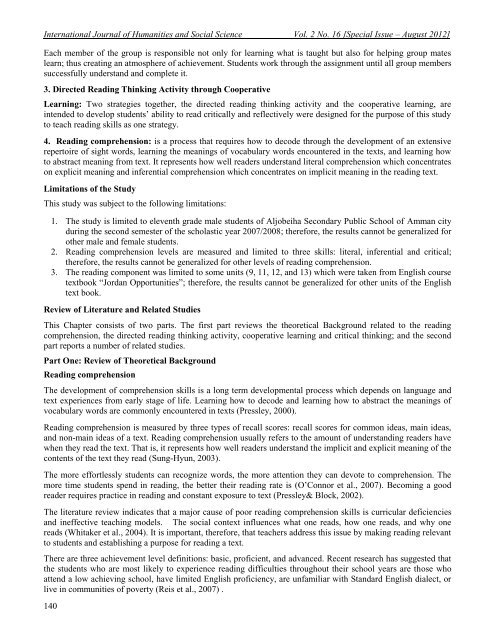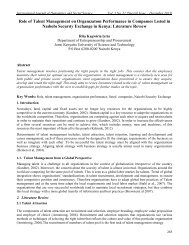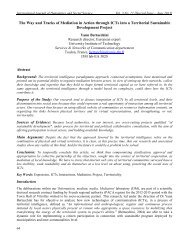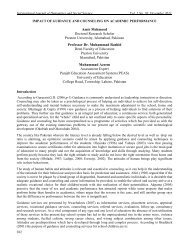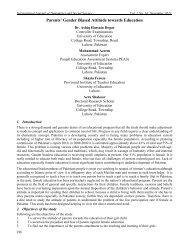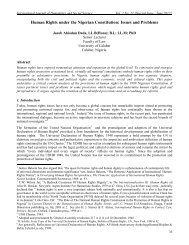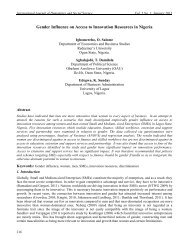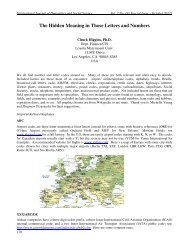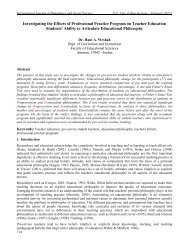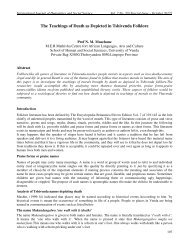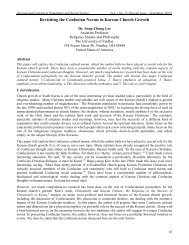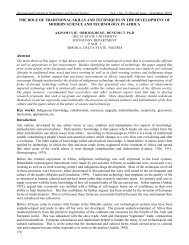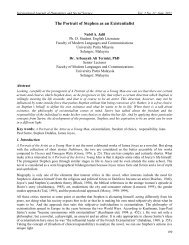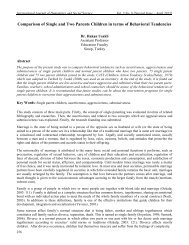The Effect of the Directed Reading Thinking Activity through ...
The Effect of the Directed Reading Thinking Activity through ...
The Effect of the Directed Reading Thinking Activity through ...
Create successful ePaper yourself
Turn your PDF publications into a flip-book with our unique Google optimized e-Paper software.
International Journal <strong>of</strong> Humanities and Social Science Vol. 2 No. 16 [Special Issue – August 2012]<br />
Each member <strong>of</strong> <strong>the</strong> group is responsible not only for learning what is taught but also for helping group mates<br />
learn; thus creating an atmosphere <strong>of</strong> achievement. Students work <strong>through</strong> <strong>the</strong> assignment until all group members<br />
successfully understand and complete it.<br />
3. <strong>Directed</strong> <strong>Reading</strong> <strong>Thinking</strong> <strong>Activity</strong> <strong>through</strong> Cooperative<br />
Learning: Two strategies toge<strong>the</strong>r, <strong>the</strong> directed reading thinking activity and <strong>the</strong> cooperative learning, are<br />
intended to develop students’ ability to read critically and reflectively were designed for <strong>the</strong> purpose <strong>of</strong> this study<br />
to teach reading skills as one strategy.<br />
4. <strong>Reading</strong> comprehension: is a process that requires how to decode <strong>through</strong> <strong>the</strong> development <strong>of</strong> an extensive<br />
repertoire <strong>of</strong> sight words, learning <strong>the</strong> meanings <strong>of</strong> vocabulary words encountered in <strong>the</strong> texts, and learning how<br />
to abstract meaning from text. It represents how well readers understand literal comprehension which concentrates<br />
on explicit meaning and inferential comprehension which concentrates on implicit meaning in <strong>the</strong> reading text.<br />
Limitations <strong>of</strong> <strong>the</strong> Study<br />
This study was subject to <strong>the</strong> following limitations:<br />
1. <strong>The</strong> study is limited to eleventh grade male students <strong>of</strong> Aljobeiha Secondary Public School <strong>of</strong> Amman city<br />
during <strong>the</strong> second semester <strong>of</strong> <strong>the</strong> scholastic year 2007/2008; <strong>the</strong>refore, <strong>the</strong> results cannot be generalized for<br />
o<strong>the</strong>r male and female students.<br />
2. <strong>Reading</strong> comprehension levels are measured and limited to three skills: literal, inferential and critical;<br />
<strong>the</strong>refore, <strong>the</strong> results cannot be generalized for o<strong>the</strong>r levels <strong>of</strong> reading comprehension.<br />
3. <strong>The</strong> reading component was limited to some units (9, 11, 12, and 13) which were taken from English course<br />
textbook “Jordan Opportunities”; <strong>the</strong>refore, <strong>the</strong> results cannot be generalized for o<strong>the</strong>r units <strong>of</strong> <strong>the</strong> English<br />
text book.<br />
Review <strong>of</strong> Literature and Related Studies<br />
This Chapter consists <strong>of</strong> two parts. <strong>The</strong> first part reviews <strong>the</strong> <strong>the</strong>oretical Background related to <strong>the</strong> reading<br />
comprehension, <strong>the</strong> directed reading thinking activity, cooperative learning and critical thinking; and <strong>the</strong> second<br />
part reports a number <strong>of</strong> related studies.<br />
Part One: Review <strong>of</strong> <strong>The</strong>oretical Background<br />
<strong>Reading</strong> comprehension<br />
<strong>The</strong> development <strong>of</strong> comprehension skills is a long term developmental process which depends on language and<br />
text experiences from early stage <strong>of</strong> life. Learning how to decode and learning how to abstract <strong>the</strong> meanings <strong>of</strong><br />
vocabulary words are commonly encountered in texts (Pressley, 2000).<br />
<strong>Reading</strong> comprehension is measured by three types <strong>of</strong> recall scores: recall scores for common ideas, main ideas,<br />
and non-main ideas <strong>of</strong> a text. <strong>Reading</strong> comprehension usually refers to <strong>the</strong> amount <strong>of</strong> understanding readers have<br />
when <strong>the</strong>y read <strong>the</strong> text. That is, it represents how well readers understand <strong>the</strong> implicit and explicit meaning <strong>of</strong> <strong>the</strong><br />
contents <strong>of</strong> <strong>the</strong> text <strong>the</strong>y read (Sung-Hyun, 2003).<br />
<strong>The</strong> more effortlessly students can recognize words, <strong>the</strong> more attention <strong>the</strong>y can devote to comprehension. <strong>The</strong><br />
more time students spend in reading, <strong>the</strong> better <strong>the</strong>ir reading rate is (O’Connor et al., 2007). Becoming a good<br />
reader requires practice in reading and constant exposure to text (Pressley& Block, 2002).<br />
<strong>The</strong> literature review indicates that a major cause <strong>of</strong> poor reading comprehension skills is curricular deficiencies<br />
and ineffective teaching models. <strong>The</strong> social context influences what one reads, how one reads, and why one<br />
reads (Whitaker et al., 2004). It is important, <strong>the</strong>refore, that teachers address this issue by making reading relevant<br />
to students and establishing a purpose for reading a text.<br />
<strong>The</strong>re are three achievement level definitions: basic, pr<strong>of</strong>icient, and advanced. Recent research has suggested that<br />
<strong>the</strong> students who are most likely to experience reading difficulties <strong>through</strong>out <strong>the</strong>ir school years are those who<br />
attend a low achieving school, have limited English pr<strong>of</strong>iciency, are unfamiliar with Standard English dialect, or<br />
live in communities <strong>of</strong> poverty (Reis et al., 2007) .<br />
140


